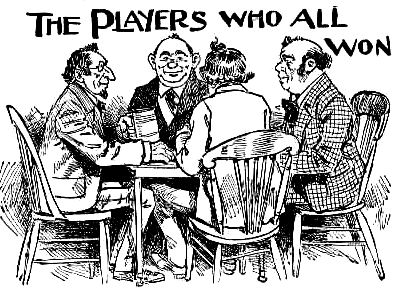



THIS PUZZLE IS A conundrum pure and simple, given as a reply to an oft-repeated query, as to “whether the solving of riddles and conundrums should be looked upon as valuable mental exercise?” To which I would reply, that from a careful observation of such matters, it may be said that there is no better elementary training for the mind. The benefits are so apparent when a party of young folks are brought together that it is safe to say that those who have not been accustomed to solving conundrums would readily be conspicuous for their dullness, for it can well be said that there are no stupids in the world of puzzledom. Nothing sharpens the wit, and makes the young folks bright and companionable like the study of conundrums, puzzles and tricks, so. As Dr. Wilfred Hall has most justly said; “Parents cannot be recommeded too strongly to encourage the practice of such amusements.” The picture, which represents an enterprising little bruin making a tour of the dry-goods district, tells its own story. Therefore. To answer this puzzle you need only answer the conundrum: What does the bear want ?
What did the bear want? Why, as he was in a dry goods store, he wanted muslin!
2.

As an improvement upon the accepted notion that winners can only gain as much as the losers lose. I take occasion to call attention to a more profitable style of play, of which it is narrated:
Four jolly men sat down to play,
And played all night till break of day;
They played for gold and not for fun,
With separate scores for evey one,
Yet, when they came to square accounts,
They all had made quite fair amounts!
Can you the paradox explain?
If no one lost, how could all gain?
The players who all won were fiddlers in the German band and gained $5 per night. I did not intimate they were card players.
[Page 28]